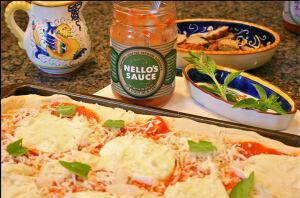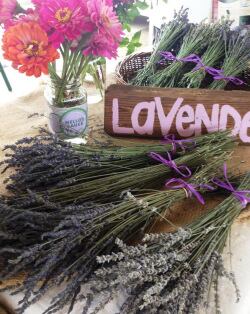“The look has basically remained the same (certainly the logo has) but the labels always improve. One must have a beautiful label or else it's like going to the ball wearing burlap.”
But you also need to be absolutely relentless, convinced that failure is not an option, and prepared to take risks, says Raleigh, NC-based McTighe, who adds some lavender to his pomodoro sauce, and has a very distinctive label.
He also produces a 14oz jar as well as the standard 25oz jar (in part to stand out, in part to ensure his premium product is affordable, and in part because more people are living in households with one or two people in, he says).
And as for taking risks, he is also working with Whole Foods to produce the first US-grown, US-made biodynamic tomato sauce on the market - an exclusive product likely to get a lot of attention that could be followed by pesto and other products.
If you do succeed and build a brand that has some real value, you can make money
“If you asked 100 food entrepreneurs if they have ever paused and thought why on earth am I doing this, 100 of them would say yes,” says McTighe, who started selling his pasta sauces in 2011, gave up the day job at Duke University Press in 2012, and is now on course to be in 600-800 stores next year from Whole Foods to Harris Teeter, and The Central Market, primarily across the south-east.

“And if they didn’t, there’s probably something wrong with them,” adds McTighe, who fell in love with Italy (and Italian food) after spending time there as a student, has a PhD in Italian Studies, and has years of experience teaching Italian language and culture (he’s now an adjunct professor of Italian at Meredith College in Raleigh, NC).
“But you can make it, even in a category like pasta sauce, where the costs are high, the margins are low and there is a huge amount of competition. That’s the beauty of the food industry, if you do succeed and build a brand that has some real value, you can make money.”
We see Biodynamic as an avenue through which Nello's can fill a gap in the market
It also helps to work with retailers that want to develop partnerships with suppliers into order to have exclusive products, says McTighe, who has been working with Whole Foods since 2011 when his sauces launched it its southern region, and has just secured a local producer loan from the chain to develop the new biodynamic products.
“We've since become a leader in the category in the southeast, and have expanded beyond in the past six months… We see Biodynamic as an avenue through which Nello's can fill a gap in the market. This product will be the only U.S.-grown, U.S.-made Biodynamic tomato sauce on the market.

“Production will be challenging but an absolutely exciting journey for us," he says.
"We have a certified Biodynamic farmer partner. We'll plant acreage and harvest in summer 2015. At that point, we'll clean, cook, and jar thousands of cases for distribution in Whole Foods [click HERE for details on Whole Foods and biodynamic agriculture]."
If you use pastes and purees, you just don’t get the same range of flavor
But is there really such a big difference the leading brands and Nello’s sauces, which contain vine-ripened whole tomatoes, cold-pressed extra virgin olive oil, salt, and various seasonings depending on the product (hot & spicy arrabbiata; lavender pomodoro; and marinara)?
The key is getting the right tomatoes, says McTighe, who says many larger brands have tomato puree, paste or even water as their first ingredient; use corn or canola oil; and add sugar and a lot of salt for flavor.
“If you use pastes and purees, you just don’t get the same range of flavor, and you need to add more salt and sugar to make up for it,” he claims. “My sauces are all lower than most in sodium (220mg per serving) and have no added sugar or high fructose corn syrup.”
Food business incubators bridge the gap between your kitchen and a co-packer
From an operational perspective, meanwhile, being able to use a local food incubator in Raleigh has been keen to his success, says McTighe, who started renting production facilities at the Piedmont Food & Agricultural Processing Center in Hillsborough by the hour in spring 2012, which helped him at a time when his business was ramping up (too much for a domestic kitchen) but he didn’t have the volumes to work with a co-manufacturer.

“The fee structure was very flexible, you could rent by the hour and the storage fees were relatively inexpensive, so I was suddenly able to do things I couldn’t do before.
"We have outgrown it now but the great thing is that I’d got to the point where my co-packer uses ingredients that I supply, as our suppliers have grown with us, so my product has not changed at all since leaving [the incubator].”
MBA students - an untapped resource for entrepreneurs?
Rather than splashing out on consultancy fees in the early days, he also found a somewhat cheaper way to get advice: “I was teaching Italian in the building [at Meredith College] where the MBA program was and I thought this could be a great resource, so I reached out to the marketing professor, and her students ended up spending a whole semester looking at Nello's."
The benefits were strategic - the students helped to identify new market opportunities and customers - but also very practical, he says. “One of the students really helped me with accounting, and I also got some great advice on using social media. It’s a resource I think more businesses should tap, as it’s free, and the students get a lot out of it too.”
Most of all you just have to do your homework
But the toughest part in the early days was all the hustling he had to do, recalls McTighe.
"Buyers are the hardest people to get in touch with on the planet, especially on some of the bigger accounts. They want to build as many walls between themselves and people like me as they possibly can. But I can also see why. They are probably receiving hundreds of emails a day from people telling them how great their products are.
“But you get to learn when you're wasting your time and when you're not, and then if you detect a genuine interest, you have to be relentless in following up with emails, calls and samples. But most of all you just have to do your homework.”
